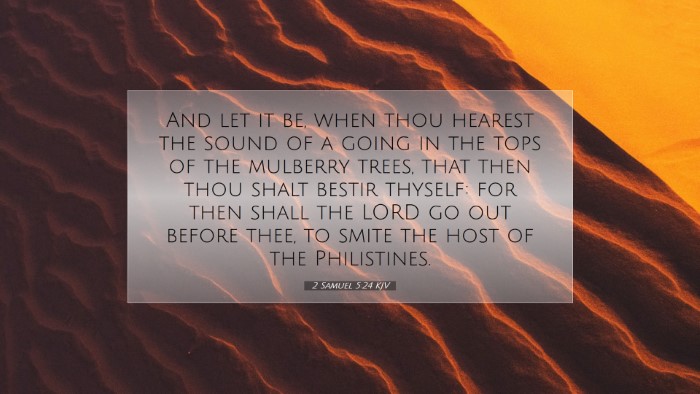Commentary on 2 Samuel 5:24
Verse Reference: 2 Samuel 5:24 - "And let it be, when thou hearest the sound of a going in the tops of the mulberry trees, that then thou shalt bestir thyself: for then shall the LORD go out before thee to smite the host of the Philistines."
Introduction
The context of this verse occurs after David has become the king of Israel and has faced opposition from the Philistines. He seeks divine guidance in warfare, illustrating the dependence of godly leaders on God’s direction. The command given by God to David at this moment reveals deep theological insights applicable to both the leadership and spirituality in the life of God’s people, making it a critical verse to explore.
Commentary Insights
Matthew Henry’s Commentary
According to Matthew Henry, this verse emphasizes the importance of divine direction in battle. David is not merely relying on his own military strategy but is sensitive to the Lord's cues. The "sound of a going in the tops of the mulberry trees" signifies divine activity; it suggests a celestial advance that David is to respond to. Henry notes that God’s direction is often subtle and requires discernment. The phrase implies that God would go before David, assuring victory for the Israelites, which echoes the theme of God as a warrior on behalf of His people.
Albert Barnes’ Commentary
Albert Barnes highlights that the mulberry trees, also known as balsam trees, serve as a metaphor for divine intervention that is both prompt and powerful. Barnes points out that the sound of marching in the treetops likely symbolizes an army of angels or divine forces prepared to act on Israel’s behalf. This illustrates a recurring biblical principle: God acts in ways that are often beyond human perception, and His signals can be subtle yet profound, revealing that human understanding must always yield to divine wisdom and timing.
Adam Clarke’s Commentary
Adam Clarke provides a detailed examination of the implications of God's preemptive action in this verse. He asserts that the instruction David receives to 'bestir' himself conveys urgency and energy in responding to divine signals. Clarke further explains that the instruction reflects God’s desire for active human participation in the fulfillment of His promises. The sound of movement signifies God’s power being manifest—an assurance that He is doing His part as David takes the necessary steps following divine guidance.
Theological Implications
This verse illustrates several major theological themes:
- Divine Sovereignty: It portrays God’s absolute control over the affairs of men and nations.
- Human Responsibility: While divine intervention is crucial, human action in response to God’s leading is equally important.
- Victory Through Divine Assistance: It reaffirms that success against adversaries comes from God and not from human strength.
Practical Applications
This passage offers profound implications for contemporary Christian leadership and ministry:
- Seeking Divine Guidance: Leaders should consistently seek God’s direction in all decisions, particularly in difficult situations.
- Listening for God's Cues: Developing a sensitivity to God’s leading in various forms is essential for effective ministry.
- Taking Action in Faith: Once clear signs and guidance are received, there is an imperative to act with confidence, knowing God’s assurance accompanies that action.
Conclusion
In 2 Samuel 5:24, we find a rich tapestry of spiritual wisdom that transcends its historical context. The call for attentiveness to God's movements, the assurance of His preeminence in battle, and the call for active cooperation are timeless truths that resonate with pastors, students, theologians, and scholars alike. The preparation and expectation that God provides victory fosters a reliance not just on human capabilities but on divine providence, shaping the faith and practices of all who stand in leadership within the church today.


